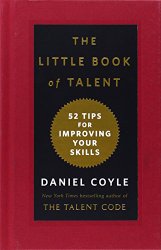Over the past year, I've been reading, writing, and thinking a lot about what it takes to get great at teaching.
This is partly because I'm insanely curious about it. After all, if I'm going to do something, I want to do it (or be on the way to doing it) great.
It's also because of the e-book project I'm working on, which I'm tentatively calling Never Finished: Continually Becoming the Teachers We Want to Be (and Staying Sane in the Process).
If you'll allow me a two-minute, homemade commercial for the book:
 Meet Daniel Coyle — the talent guru
Meet Daniel Coyle — the talent guru
In my reading, I keep falling in love with the work of Daniel Coyle.
I'm not a Coyle newbie — his article for the New York Times is a part of our English 9 curriculum, so my students and I know about deliberate practice and a magical, fatty, sausage-like substance called myelin.
Yet I'm also not a Coyle expert. He's written The Talent Code (on my to-read list) and The Little Book of Talent: 52 Tips for Improving Your Skills (I read this one yesterday — it's a total one-sitting read; love it).
But here's what I do know about Daniel Coyle — his findings about how to gain skill come down to two simple words that we can focus on as teachers who desire to get great at this job: reach and stare.
How to “Reach”
Reaching happens when we practice our skills within “the sweet spot.”
From The Little Book of Talent: 52 Tips for Improving Your Skills:
Sensations [of the sweet spot]: Frustration, difficulty, alertness to errors. You're fully engaged in an intense struggle — as if you're stretching with all your might for a nearly unreachable goal, brushing it with your fingertips, then reaching again.
Coyle goes on to say that you'll know you're in your sweet spot (basically Vygotsky's Zone of Proximal Development) when you are successfully completing the skill you're working on 50-80 percent of the time.
If you're successful more often than that, you're in your comfort zone; successful much less, and you're in the survival zone.
Want to “reach” more effectively? Break skills into chunks, Coyle says.
From The Little Book of Talent: 52 Tips for Improving Your Skills:
Chunks are to skill what letters of the alphabet are to language. Alone, each is nearly useless, but when combined into bigger chunks (words) and when those chunks are combined into still bigger things (sentences, paragraphs), they can build something complex and beautiful.
Don't try to get better at something as vast as literacy instruction — get better at teaching speech delivery or annotating or quickwriting. Don't aim to “be more organized” — aim to develop a system for managing incoming paperwork.
How to “Stare”
From The Little Book of Talent: 52 Tips for Improving Your Skills:
If you were to visit a dozen talent hotbeds [i.e., places where an abnormal percentage of top performers are trained in a given field] tomorrow, you would be struck by how much time the learners spend observing top performers. When I say ‘observing,' I'm not talking about passively watching. I'm talking about staring — the kind of raw, unblinking, intensely absorbed gazes you see in hungry cats or newborn babies.
This past month, I've had some of the best PD in my life:
- I filmed and edited teaching video of two of my colleagues (Doug Stark, English; and Josh Cooper, economics).
- I observed our AP US History and AP European History teacher, Gus Kapolka, for a full week.
- (It was my student teacher's final few weeks, so I had a few hours a day to wander around the school building.)
Coyle helps me realize why — when I observe my colleagues, I'm staring at them in an effort to improve my skills.
Some more methods for staring:
- Read PD books. But read 'em smarter, not harder. If you're reading is passive, you're not “staring” in the way Coyle talks about.
- Get a mentor. And remember — think smarter about mentorship.
In summary
To get better at teaching:
- Reach by chunking skills and living in your sweet spots.
- Stare by intensely observing pros — in real life, through their PD books, or through mentorship.
VrKimmel says
Ok, your blog post was compelling enough that I ordered and read The Little Book of Talent. My mind is buzzing with 1) personal application–how can I get better at my “skills”? and 2) what would it look like to facilitate the application of these 52 (some, not all) skills for students?
For example, what power might there be in students embracing “small actions, over time, transform us”?
Keep up the transformative thinking, Dave. And the writing thing, keep that up, too. It’s making a difference.